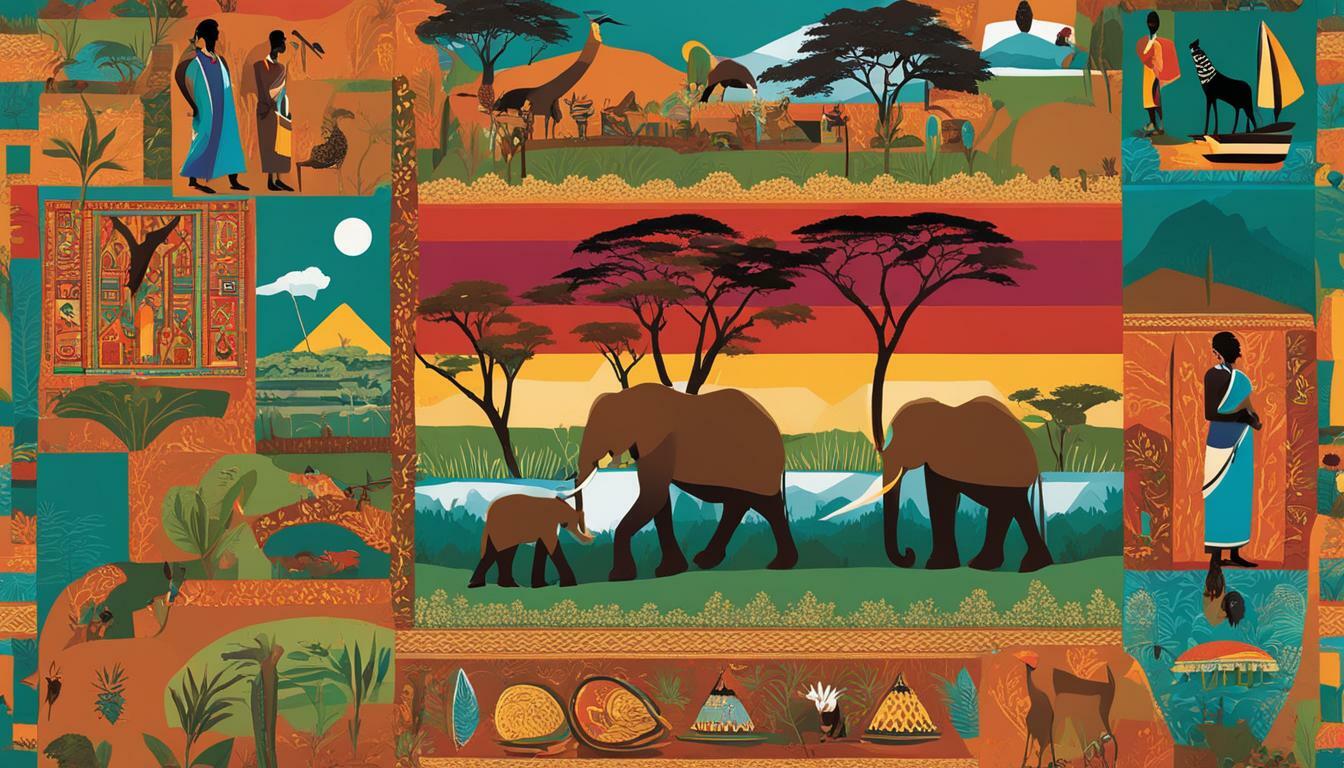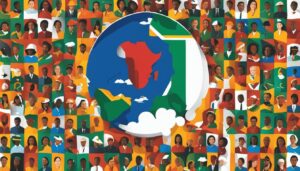Kenya is a diverse country with a rich linguistic culture, and in this section, we will delve into the question, “What language do they speak in Kenya?”
Key Takeaways:
- The official languages of Kenya are English and Swahili.
- Swahili is widely spoken and serves as a lingua franca in trade, commerce, communications, and education.
- Approximately 17 million people in Kenya speak Swahili.
- English is spoken by about 2.7 million people in the country.
- In addition to English and Swahili, Kenya is home to many indigenous languages, including Gikuyu, Dholuo, Kalenjin, Somali, and Arabic.
- There are approximately 70 languages spoken in Kenya in total.
- Kenya’s urban youth have developed a unique urban language called Sheng, which is a mix of Swahili, English, and other ethnic languages.
Official Languages of Kenya
English and Swahili are the official languages of Kenya, playing a vital role in various aspects of Kenyan society. Swahili, also known as Kiswahili, is widely spoken as a lingua franca and serves as a means of communication among people from different ethnic backgrounds. It is estimated that approximately 17 million people in Kenya speak Swahili, making it one of the most widely used languages in the country.
On the other hand, English is spoken by about 2.7 million people in Kenya. It is primarily used in formal settings, such as government institutions, education, and commerce. English proficiency is highly valued and seen as a gateway to opportunities in Kenya and beyond.
In addition to English and Swahili, Kenya is home to a rich linguistic tapestry with numerous indigenous languages. These include Gikuyu, Dholuo, Kalenjin, Somali, and Arabic, among many others. In fact, it is estimated that there are approximately 70 languages spoken in Kenya in total, reflecting the country’s diverse cultural heritage.
| Language | Number of Speakers |
|---|---|
| Swahili | Approximately 17 million |
| English | Approximately 2.7 million |
Furthermore, Kenya’s urban youth have developed a unique language known as Sheng. This vibrant urban slang is a blend of Swahili, English, and other ethnic languages. It has become popular among young people in Kenya’s cities and has even gained recognition in music and popular culture.
Language Diversity in Kenya
The linguistic diversity in Kenya is a reflection of the country’s multicultural society. Each language carries with it a unique history, traditions, and cultural identity. The rich tapestry of languages spoken in Kenya not only showcases the country’s cultural richness but also serves as a reminder of the importance of language in preserving heritage and fostering inclusivity.
Swahili in Kenya
Swahili, a Bantu language with significant Arabic influences, is widely spoken in Kenya and serves as a lingua franca among different ethnic groups. With approximately 17 million speakers, it plays a crucial role in facilitating communication across the country.
Swahili, also known as Kiswahili, is the national language of Kenya and one of the two official languages alongside English. It holds immense cultural significance and is taught in schools, used in government administration, and employed in the media. The language’s wide usage makes it accessible to people from diverse backgrounds and acts as a unifying force.
Not only is Swahili popular within Kenya, but it is also spoken in neighboring East African countries such as Tanzania, Uganda, and the Democratic Republic of Congo. This widespread usage further enhances its importance as a means of communication in the region.
Swahili Vocabulary
Swahili vocabulary showcases its linguistic influences. The language incorporates words from Arabic, Persian, English, and Portuguese, resulting in a unique blend. For example, the Swahili word for “book” is “kitabu,” derived from Arabic, while the word for “thank you” is “asante,” borrowed from Portuguese. This linguistic fusion reflects the cultural diversity and historical trade relations of the region.
| Swahili vocabulary | Meaning |
|---|---|
| Hakuna matata | No worries |
| Jambo | Hello |
| Pole pole | Slowly, slowly |
The inclusion of Arabic words in Swahili is particularly evident in the coastal regions of Kenya, where Swahili developed as a trade language centuries ago. This historical connection to Arab traders has left a lasting impact on the language’s vocabulary, making it a fascinating linguistic blend.
Conclusion
In conclusion, Swahili holds a significant place in Kenyan society. As a widely spoken language and a means of cultural expression, it portrays the rich diversity and history of the country. Swahili serves as a symbol of unity, allowing people from different ethnic backgrounds to communicate and understand each other. Its linguistic influences from Arabic, Persian, English, and Portuguese add further depth to its vocabulary, creating a vibrant and unique language spoken by millions in Kenya.
English in Kenya
English, as one of the official languages in Kenya, plays a crucial role in education, governance, and business. It serves as a medium of instruction in schools and universities, allowing students to access a wider range of educational resources and opportunities. Proficiency in English is highly valued in the job market, as it opens doors to employment in multinational companies and international organizations.
Moreover, English is widely used in government institutions, enabling effective communication and collaboration at the national level. It facilitates the drafting of policies, laws, and official documents, ensuring clarity and coherence in governance. Additionally, English serves as the language of diplomacy, enabling Kenya to engage with other English-speaking countries on matters of international importance.
English also plays a significant role in the business sector, particularly in trade and commerce. Many Kenyan companies operate in global markets, and English proficiency is essential for effective communication with international partners and clients. Additionally, the tourism industry heavily relies on English, as it is the lingua franca for interactions between visitors and locals.
In conclusion, English is a vital language in Kenya, serving as a bridge between different communities and facilitating communication on various levels. Its importance in education, governance, and business underscores the need for English proficiency in today’s interconnected world.
Indigenous Languages in Kenya
In addition to Swahili and English, Kenya boasts a wide array of indigenous languages, each with its own unique characteristics and cultural significance. These tribal languages are an integral part of Kenya’s rich linguistic tapestry. With approximately 70 languages spoken throughout the country, Kenya’s linguistic diversity is a testament to its diverse ethnic groups and cultural heritage.
Some of the prominent indigenous languages spoken in Kenya include Gikuyu, Dholuo, Kalenjin, Somali, and Arabic. Gikuyu is spoken by the Kikuyu community, the largest ethnic group in Kenya, while Dholuo is primarily spoken by the Luo community. Kalenjin is spoken by several communities, including the Kalenjin, Nandi, and Pokot. Additionally, Somali is spoken by the Somali community, and Arabic is spoken by the Swahili community along the coast.
Each indigenous language in Kenya carries its own unique cultural significance. These languages are often intertwined with local customs, traditions, and folklore, serving as a means of preserving and passing on cultural heritage from one generation to the next. They are used in various aspects of daily life, including storytelling, rituals, songs, and conversations within specific communities.
| Language | Number of Speakers |
|---|---|
| Gikuyu | 6.6 million |
| Dholuo | 4 million |
| Kalenjin | 4.2 million |
| Somali | 3.3 million |
| Arabic | 2 million |
It is important to note that while English and Swahili are widely spoken and serve as important lingua francas in Kenya, the preservation and celebration of indigenous languages play a vital role in promoting cultural diversity and inclusivity within the country. The unique linguistic landscape of Kenya serves as a reflection of the country’s rich cultural heritage and the resilience of its diverse communities.
Other Languages and Sheng
Apart from the commonly spoken languages, Kenya boasts numerous ethnic languages such as Gikuyu, Dholuo, Kalenjin, Somali, and Arabic, each representing the cultural diversity of the country. These indigenous languages are spoken by different tribes across Kenya and play a vital role in preserving their heritage and traditions.
One fascinating aspect of Kenya’s linguistic landscape is the emergence of Sheng, a vibrant urban language that has gained popularity among Kenya’s youth. Sheng is a fusion of Swahili, English, and various ethnic languages, creating a unique and dynamic form of communication. It reflects the urban lifestyle, street culture, and modern expressions of Kenyan youth.
Sheng has its roots in Nairobi’s bustling informal settlements, where a mix of different ethnic groups and languages coexist. It has evolved organically over the years, incorporating new words, phrases, and slang from various communities. Sheng serves as a unifying language among young people from different backgrounds, creating a sense of identity and belonging.
Sheng has even made its way into mainstream media, music, and entertainment, further solidifying its influence on Kenyan popular culture. It has become an important tool for self-expression, artistic creativity, and social commentary. The use of Sheng is not limited to urban areas; it has spread across the country, transcending boundaries and connecting people from different regions.
Table: Ethnic Languages in Kenya
| Language | Number of Speakers |
|---|---|
| Gikuyu | 6.6 million |
| Dholuo | 4 million |
| Kalenjin | 4 million |
| Somali | 2.4 million |
| Arabic | 2 million |
The linguistic diversity in Kenya is a testament to the rich cultural heritage and history of the country. From the official languages of English and Swahili to the indigenous languages and the vibrant urban language of Sheng, each language represents a unique thread in the colorful tapestry of Kenya’s linguistic landscape.
Conclusion
In conclusion, Kenya’s linguistic diversity is a testament to the country’s rich cultural heritage, with Swahili and English serving as official languages, indigenous languages representing different ethnic groups, and the vibrant urban language of Sheng adding yet another layer of linguistic expression.
Swahili, with its widespread usage as a lingua franca, plays a crucial role in facilitating communication, trade, and education throughout Kenya. Spoken by approximately 17 million people, it has become an integral part of daily life in the country.
English, spoken by around 2.7 million people in Kenya, also holds significant importance. As a global language, it bridges the gap between different communities, enables international communication, and plays a pivotal role in education and business.
In addition to the official languages, Kenya boasts a diverse array of indigenous languages, representing the country’s various ethnic groups. From Gikuyu to Dholuo, Kalenjin to Somali, and Arabic to many others, these languages serve as a reflection of the cultural identities and traditions of their respective communities.
Furthermore, the unique urban language of Sheng adds a vibrant and dynamic element to Kenya’s linguistic tapestry. A fusion of Swahili, English, and other ethnic languages, Sheng is widely spoken among Kenya’s urban youth, providing them with a sense of belonging and cultural expression.
With approximately 70 languages spoken in Kenya, the country stands as a linguistically diverse nation, where different languages coexist and contribute to the vibrant tapestry of culture and communication. This linguistic richness truly reflects the diverse and multicultural nature of Kenya.
FAQ
What are the main languages spoken in Kenya?
The main languages spoken in Kenya are English and Swahili. Additionally, there are many indigenous languages spoken, such as Gikuyu, Dholuo, Kalenjin, Somali, and Arabic.
How many people in Kenya speak Swahili?
Around 17 million people in Kenya speak Swahili. It is widely used as a lingua franca for trade, commerce, communications, and education.
How many people in Kenya speak English?
Approximately 2.7 million people in Kenya speak English. It is also one of the official languages of the country.
What is Sheng?
Sheng is a unique urban language in Kenya that is popular among the country’s urban youth. It is a mixture of Swahili, English, and other ethnic languages.
How many languages are spoken in Kenya in total?
There are approximately 70 languages spoken in Kenya, including English, Swahili, and various indigenous languages.



